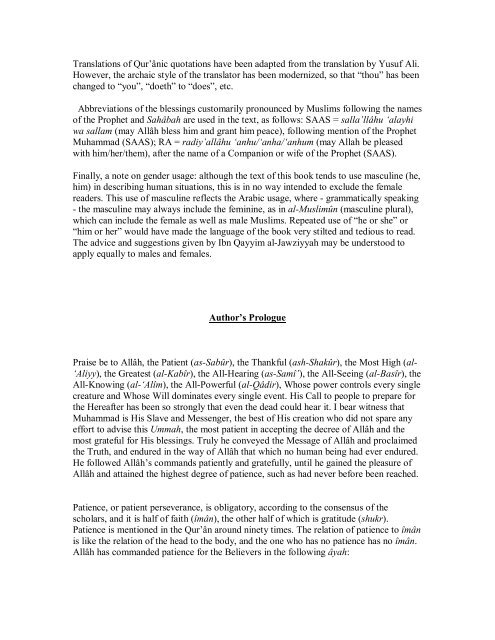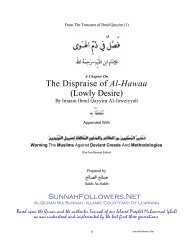Patience and gratitude - Al Quran wa Sunnah
Patience and gratitude - Al Quran wa Sunnah
Patience and gratitude - Al Quran wa Sunnah
Create successful ePaper yourself
Turn your PDF publications into a flip-book with our unique Google optimized e-Paper software.
Translations of Qur’ânic quotations have been adapted from the translation by Yusuf <strong>Al</strong>i.<br />
However, the archaic style of the translator has been modernized, so that “thou” has been<br />
changed to “you”, “doeth” to “does”, etc.<br />
Abbreviations of the blessings customarily pronounced by Muslims following the names<br />
of the Prophet <strong>and</strong> Sahâbah are used in the text, as follows: SAAS = salla’llâhu ‘alayhi<br />
<strong>wa</strong> sallam (may <strong>Al</strong>lâh bless him <strong>and</strong> grant him peace), following mention of the Prophet<br />
Muhammad (SAAS); RA = radiy’allâhu ‘anhu/‘anha/‘anhum (may <strong>Al</strong>lah be pleased<br />
with him/her/them), after the name of a Companion or wife of the Prophet (SAAS).<br />
Finally, a note on gender usage: although the text of this book tends to use masculine (he,<br />
him) in describing human situations, this is in no <strong>wa</strong>y intended to exclude the female<br />
readers. This use of masculine reflects the Arabic usage, where - grammatically speaking<br />
- the masculine may al<strong>wa</strong>ys include the feminine, as in al-Muslimûn (masculine plural),<br />
which can include the female as well as male Muslims. Repeated use of “he or she” or<br />
“him or her” would have made the language of the book very stilted <strong>and</strong> tedious to read.<br />
The advice <strong>and</strong> suggestions given by Ibn Qayyim al-Jawziyyah may be understood to<br />
apply equally to males <strong>and</strong> females.<br />
Author’s Prologue<br />
Praise be to <strong>Al</strong>lâh, the Patient (as-Sabûr), the Thankful (ash-Shakûr), the Most High (al-<br />
‘<strong>Al</strong>iyy), the Greatest (al-Kabîr), the <strong>Al</strong>l-Hearing (as-Samî’), the <strong>Al</strong>l-Seeing (al-Basîr), the<br />
<strong>Al</strong>l-Knowing (al-‘<strong>Al</strong>îm), the <strong>Al</strong>l-Powerful (al-Qâdir), Whose power controls every single<br />
creature <strong>and</strong> Whose Will dominates every single event. His Call to people to prepare for<br />
the Hereafter has been so strongly that even the dead could hear it. I bear witness that<br />
Muhammad is His Slave <strong>and</strong> Messenger, the best of His creation who did not spare any<br />
effort to advise this Ummah, the most patient in accepting the decree of <strong>Al</strong>lâh <strong>and</strong> the<br />
most grateful for His blessings. Truly he conveyed the Message of <strong>Al</strong>lâh <strong>and</strong> proclaimed<br />
the Truth, <strong>and</strong> endured in the <strong>wa</strong>y of <strong>Al</strong>lâh that which no human being had ever endured.<br />
He followed <strong>Al</strong>lâh’s comm<strong>and</strong>s patiently <strong>and</strong> gratefully, until he gained the pleasure of<br />
<strong>Al</strong>lâh <strong>and</strong> attained the highest degree of patience, such as had never before been reached.<br />
<strong>Patience</strong>, or patient perseverance, is obligatory, according to the consensus of the<br />
scholars, <strong>and</strong> it is half of faith (îmân), the other half of which is <strong>gratitude</strong> (shukr).<br />
<strong>Patience</strong> is mentioned in the Qur’ân around ninety times. The relation of patience to îmân<br />
is like the relation of the head to the body, <strong>and</strong> the one who has no patience has no îmân.<br />
<strong>Al</strong>lâh has comm<strong>and</strong>ed patience for the Believers in the following âyah:




